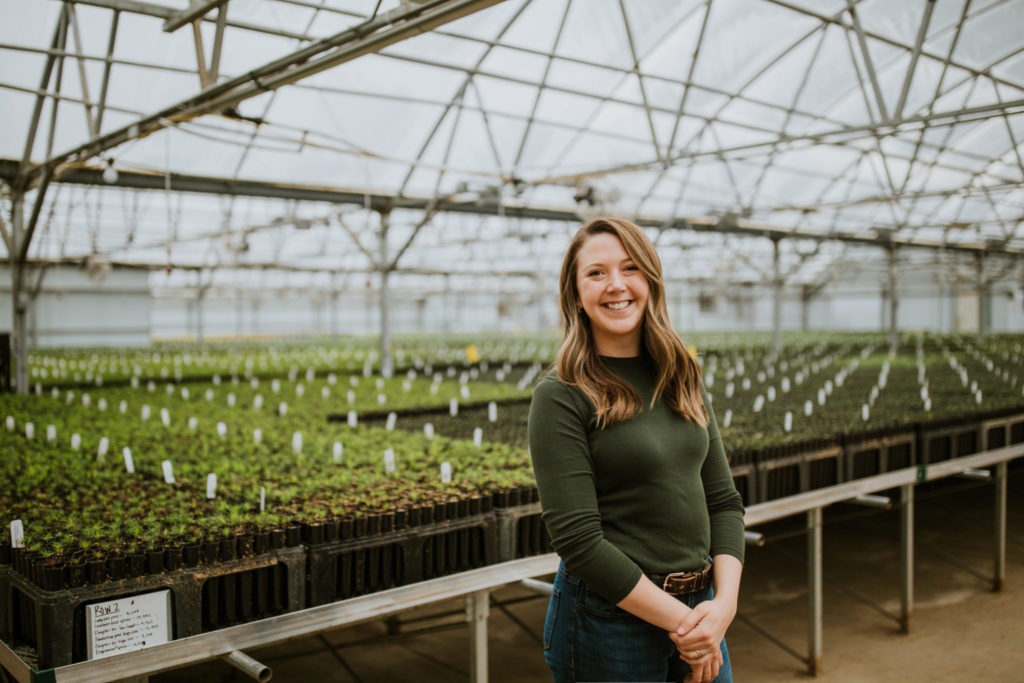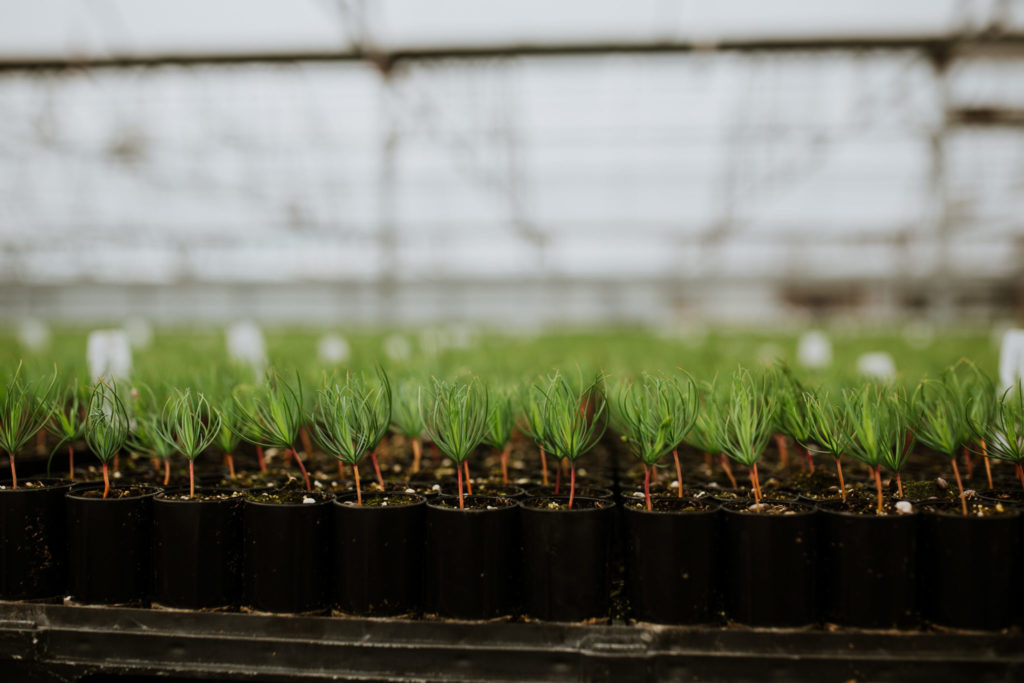
Katelynn Martinez’s career has been propelled by a simple — but ambitious — goal: to help humans coexist with the environment in a mutually beneficial balance.
After graduating from Colorado State University with a degree in forest management, Martinez spent nearly a decade working in forest health for the U.S. and Colorado State forest services. Over her career, she saw Colorado’s forests change rapidly. Eager to do more but frustrated by funding limitations in the public sector, she began researching what a triple bottom-line business solution that focuses on people, planet and profit might look like.
That research led her to the College of Business’ Impact MBA in 2020 and its emphasis on the triple bottom line. A year and a half later, she was building her own solution as she partnered with local entrepreneur Kevin Brinkman to launch OneCanopy, a privately funded conservation nursery that grows native trees and shrubs for reforestation in the Rocky Mountain region.
Martinez serves as director of operations and business development for the Loveland-based social enterprise, which is the state’s first reforestation company. With OneCanopy, she hopes to address the entire reforestation process from seed to project monitoring.
“We wanted to create a fully integrated company, a one-stop shop for reforestation,” Martinez said.
So far, OneCanopy has sold 35,000 trees for 2023 planting, and its clients include federal, state and local government entities, as well as nonprofits, tribal agencies and private landowners. Within five years, the company aims to grow three million seedling trees per year, aiding in the reforestation of 10,000 acres annually in the Rocky Mountain region.
‘A huge need for reforestation’
Reforestation is desperately needed in Colorado and across the Rocky Mountain region, Martinez said. The effects of climate change and human activity have intensified, resulting in catastrophic wildfires, droughts and outbreaks of insects and disease, just as more humans live in forest ecosystems than ever before.
“This creates the perfect storm for catastrophe and forest disturbance — and a huge need for reforestation,” she said.
She pointed to research from the Nature Conservancy and the U.S. Forest Service showing that the United States is short 30 billion trees to adequately address deforestation. There are more than three million acres of reforestation potential in Colorado, and the largest tree producers can only meet 20% of the need.
While Martinez and Brinkman were planning for the company that would become OneCanopy, Martinez began researching the five major steps of the reforestation process – project finance, seed collection and storage, nursery production, planting and post-project monitoring – to determine where they could have the most impact. They decided to start with nursery production, but they hope to expand across the reforestation pipeline.

OneCanopy designed its nursery for large-scale reforestation efforts, so it runs differently than nurseries where the average homeowner would buy plants for their yard. The company only uses seeds that originated from the Rocky Mountain region, and the plant material they sell comes in much smaller sizes than the trees and shrubs you’d find elsewhere.
“The pots tend to be about an inch and a half in diameter in about eight inches deep – we call it a plug,” Martinez said. “That’s not really something that you’d find at some of these mom-and-pop nurseries, and that’s because that’s the most efficient size for reforestation.”
For large-scale reforestation efforts, tree planters use long, narrow shovels to quickly dig a hole the same size as the root ball of the tree, she explained. They stick the plant material in the hole, cover it with their boot and keep moving.
OneCanopy also wants to work with their customers to guide the reforestation process.
“We want the right tree in the right place at the right time,” Martinez said. “I’m not trying to push trees just for the sake of pushing trees. I really want to make sure that wherever our trees end up, it makes ecological sense, so that would mean planting appropriate species at the right elevations and the right geographies.”
Helping ecosystems recover
Martinez knew early on that she was “wired for nature.” Growing up on Colorado’s Eastern Plains, she loved spending time on the Platte River and remembers what it felt like to watch gravel pits being constructed along the river.
“I would watch these pits destroy ecosystems to harvest a material that humans need for our progress, and then over time, I would watch that ecosystem rebuild itself,” she said. “It would go from an ecosystem full of trees and lots of animals and critters to a barren wasteland – but if you gave it enough time, you could start to see it recover. And that felt really powerful to me.”
Realizing that she wanted to help restore land to its full potential after it’s been disturbed, she enrolled in CSU’s Warner College of Natural Resources to study forest management.
“It’s really easy to love forestry at CSU because they have so many hands-on classes,” she said. “You’re in the woods all the time. Everybody who gets involved with forestry is incredibly passionate.”
While studying at CSU, she experienced another moment that confirmed her passion for forestry. She and her classmates were scheduled to spend several weeks at the CSU Mountain Campus, but the day before classes began, the High Park fire started. The fire burned more than 87,000 acres and destroyed 259 homes in June 2012, The Coloradoan reported.
“We got to experience first-hand some of the impact of a wildfire and how that destroys ecosystems, how that changes our livelihoods,” she said.
From government to sustainable enterprise
Martinez began her forestry career working for government agencies, where she said she met talented people with a drive to do good but saw too many projects go unfinished due to funding constraints.
Now, the idea of using business to build a better world gives her hope. She believes that government agencies and businesses can work together to solve environmental issues.
“There can be this really powerful dichotomy where people are either very pro-government or pro-business, and I think that shouldn’t be the case when we’re talking about collectively managing a resource like land,” she said.
As she made the transition from government work to helping build a social enterprise, she says the Impact MBA equipped her with essential business skills.
“It was absolutely the best thing I could have done for my career and for my knowledge base in general,” she said.
About CSU’s College of Business
The College of Business at Colorado State University is focused on using business to create a better world.
As an AACSB-accredited business school, the College is among the top five percent of business colleges worldwide, providing programs and career support services to more than 2,500 undergraduate and 1,300 graduate students. Faculty help students across our top-ranked on-campus and online programs develop the knowledge, skills and values to navigate a rapidly evolving business world and address global challenges with sustainable business solutions. Our students are known for their creativity, work ethic and resilience—resulting in an undergraduate job offer and placement rate of over 90% within 90 days of graduation.
The College’s highly ranked programs include its Online MBA, which has been ranked the No. 1 program in Colorado by U.S. News and World Report for six years running and achieved No. 16 for employability worldwide from QS Quacquarelli Symonds. The College’s Impact MBA is also ranked by Corporate Knights as a Top 20 “Better World MBA” worldwide.